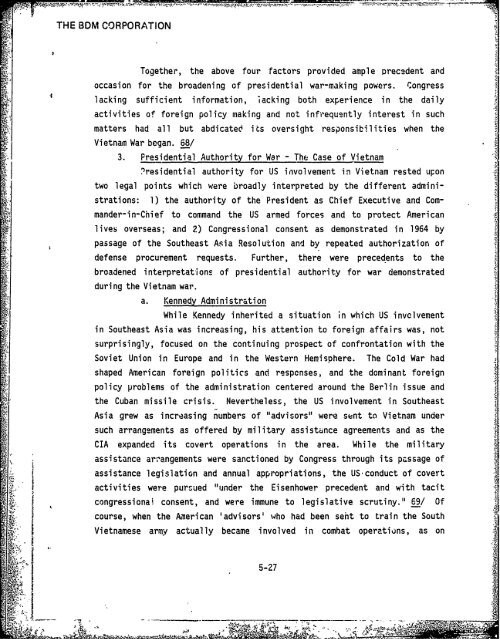policy - The Black Vault
policy - The Black Vault
policy - The Black Vault
Create successful ePaper yourself
Turn your PDF publications into a flip-book with our unique Google optimized e-Paper software.
THE BDM CORPORATION<br />
Together, the above four factors provided ample precedent and<br />
occasion for the broadening of presidential war-making powers. Congress<br />
lacking sufficient information, lacking both experience in the daily<br />
activities of foreign <strong>policy</strong> making and not infrequently interest in such<br />
matters had all but abdicated its oversight responsibilities when the<br />
Vietnam War began. 68/<br />
3. Presidential Authority for War - <strong>The</strong> Case of Vietnam<br />
2residential authority for US involvement in Vietnam rested upon<br />
two legal points which were broadly interpreted by the different administrations:<br />
1) the authority of the President as Chief Executive and Commander-in-Chief<br />
to command the US armed forces and to protect American<br />
lives overseas; and 2)<br />
Congressional consent as demonstrated in 1964 by<br />
passage of the Southeast Asia Resolution and by repeated authorization of<br />
defense procurement requests. Further, there were precedents to the<br />
broadened interpretations of presidential authority for war demonstrated<br />
during the Vietnam war.<br />
a. Kennedy Administration<br />
While Kennedy inherited a situation in which US involvement<br />
in Southeast Asia was increasing, his attention to foreign affairs was, not<br />
surprisingly, focused on the continuing prospect of confrontation with the<br />
Soviet Union in Europe and in the Western Hemisphere.<br />
shaped American foreign politics and responses,<br />
<strong>The</strong> Cold War had<br />
and the dominant foreign<br />
<strong>policy</strong> problems of the administration centered around the Berlin issue and<br />
the Cuban missile crisis. Nevertheless, the US involvement in Southeast<br />
Asia grew as increasing numbers of "advisors" were sent to Vietnam under<br />
such arrangements as offered by military assistance agreements and as the<br />
CIA expanded its covert operations in the area. While the military<br />
assistance arrangements were sanctioned by Congress through its passage of<br />
assistance legislation and annual appropriations, the US-conduct of covert<br />
activities were pursued "under the Eisenhower precedent and with tacit<br />
congressional consent, and were immune to legislative scrutiny." 69/ Of<br />
course, when the American 'advisors' who had been sent to train the South<br />
Vietnamese army. actually became involved in combat operations, as on<br />
Z5
















